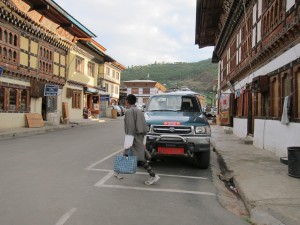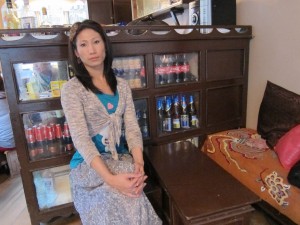Bhutan’s first transgender
In remote Bhutan, a fascinating process of unfurling is underway as the once-reclusive kingdom opens up to cautiously embrace the outside world. The kingdom is selective about what it lets in: yes to Indian soaps and K-pop, no to polluting industries. Yes to Indian-funded and -destined hydroelectricity and infrastructural development out east, no to absolute democracy. The king is still revered like a god – most homes include images of the five dynastical kings in their family shrine – and Mahayana Buddhism is part of every facet of life, even in relatively cosmopolitan Thimpu.
The country’s second democratic elections are currently underway, and it tickles me to see updates from the Bhutanese media I follow on Twitter. “Naemjog polling station voters sitting around to chat after casting their votes are asked to leave the premises by police,” reads one update.
I visited Bhutan in 2011 in a short yet memorable trip, and managed to wrest about five stories out of it. But that barely skimmed the surface of all I experienced: one of the most colourful people I met there only made it into a couple of paragraphs in a piece I wrote for The Australian’s travel section. Dechen Seldon is Bhutan’s first out and proud transgender, and at the time, the country’s only one that she knew of. (Another seven or eight have emerged since.)
I met Dechen in a teahouse in Paro after a long trek. She was just 19 at the time, tall and beautiful, fashionably dressed in Bangkok-style clothes and with a luxurious mane of long black hair. She was flirting with another customer, obviously someone she knew well, and they spoke in English, rather than Dzongka or another local language. She looked less Bhutanese and more southeast Asian, with fine features, high cheekbones and impossibly long limbs. Once she finished her conversation, I pounced, wanting to hear her story.
Born a boy in Paro, she knew from a young age that she was meant to be a girl, but it wasn’t until the age of 14 that she made the definitive decision to assert her true gender. In Bhutan, it’s commonplace – often mandated – to wear the traditional clothing: the kira for women, the gho for men. Dechen’s uniquely Bhutanese way of asserting her gender was to approach her school principal and insist that she should be permitted to wear the kira to school, rather than the gho.
It was unchartered territory for the school, so Dechen consulted with the education ministry which considered her request, then allowed it, and she then changed schools to a convent for girls. She studied for a couple more years, and was treated as a girl by all, teachers and students alike. Now she works as a beautician in central Paro. Does she ever face any discrimination? “Never. I would say 95 percent of people here accept me as I am, and the others, well, no one ever says anything to my face.”
In fact: “Children call me sister and compliment my clothes.”
Still, it wasn’t an easy decision, nor was it a smooth transition for Dechen’s family. Initially her parents disallowed her from adopting a female persona. “When I was young, my mother would say, “what will society think?” It wasn’t until her teenage years that Dechen told her mother that, with or without her help, she would be making the change. “But after, when the government accepted me, my parents did too, and now they are proud.”
So just what is life like in Bhutan for a transgender? Much like anywhere else, it appears, although perhaps with a bit more distance from potential partners. Dechen moves with ease through the main streets of central Paro – well, both of them – and describes a close-knit group of friends as her support crew. “Sometimes when I go to parties everyone would look and laugh, which made me feel bad, but now I’m used to it and don’t give a shit.”
Still, while Dechen is a groundbreaker in the tiny, mountain-flanked country, there is a long way to go. Homosexuality is illegal in Bhutan, and transgressors can be jailed from between one month to a year. LGBT rights are only starting to be talked about openly, and the government is starting to give the issue some attention – for example, last year the health ministry announced plans to investigate and map the country’s transgender population, to make sure they could access HIV programs if needed.
Read my travel piece on Bhutan in The Australian here.

